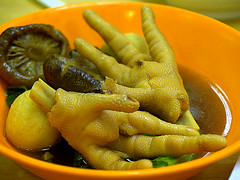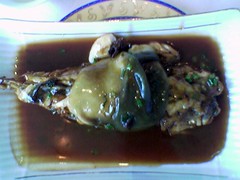JUXIAN, China - In July, two dozen Albertson's grocery stores in California received a shipment of fresh ginger and put it on shelves. Several days later, state inspectors discovered that the ginger, which had been imported from China, contained a dangerous pesticide. State health officials warned Californians to avoid ginger grown in China.
But although the tainted ginger's country of origin was clear, the actual supplier, let alone the farm where it grew, was anything but. The path of this batch of ginger, about 8,000 miles around the world, shows how global supply chains have grown so long that some U.S. companies can't be sure where the products they're buying are made or grown. And without knowing the source of the product, it's difficult to solve the problem.
DEFINITION chi-na-free adj. A term proposed for use on food labels to show that products are not made in China.
CONTEXT In light of recent health and safety scares regarding Chinese-made food and products, a U.S.-based company called Food for Health International has announced plans to put "China-free" stickers on its goods. The subtext: These products won't make you sick or have harmful contaminants like melamine.
USAGE Given recent recalls of items from toys to toothpaste, China-free labeling could catch on, though consumers would do well to remember that not all products from China are tainted and not all tainted products are from China.
Wednesday, November 21, 2007
Tainted ginger difficult to track
Posted by
Blogmonger
at
11:57 AM
0
comments
![]()
Jesus and Chinese Sweatshops
A labor rights group alleged Tuesday that crucifixes sold in religious gift shops in the U.S. are produced under "horrific" conditions in a Chinese factory with more than 15-hour work days and inadequate food.
"It's a throwback to the worst of the garment sweatshops 10, 20 years ago," said Charles Kernaghan, director of the National Labor Committee.
Kernaghan held a news conference in front of St. Patrick's Cathedral to call attention to conditions at a factory in Dongguan, a southern Chinese city near Hong Kong, where he said crosses sold at the historic church and elsewhere are made.
Spokespeople for St. Patrick's and another New York landmark, the Episcopal Trinity Church at Wall Street, said the churches had removed dozens of crucifixes from their shops while they investigate the claims.
"I don't think they have a clue where these crucifixes were made — in horrific work conditions," Kernaghan said.
Kernaghan said the factory's mostly young, female employees work from 8 a.m. to 11:30 p.m. seven days a week and are paid 26 cents an hour with no sick days or vacation. Workers live in filthy dormitories and are fed a watery "slop."
Kernaghan said factory workers took photos and smuggled out documents detailing practices there. While none of the crucifixes sold in New York were identified as made in China, they bore serial numbers matching products made at the factory in question, Kernaghan said.
Posted by
Blogmonger
at
11:27 AM
0
comments
![]()




